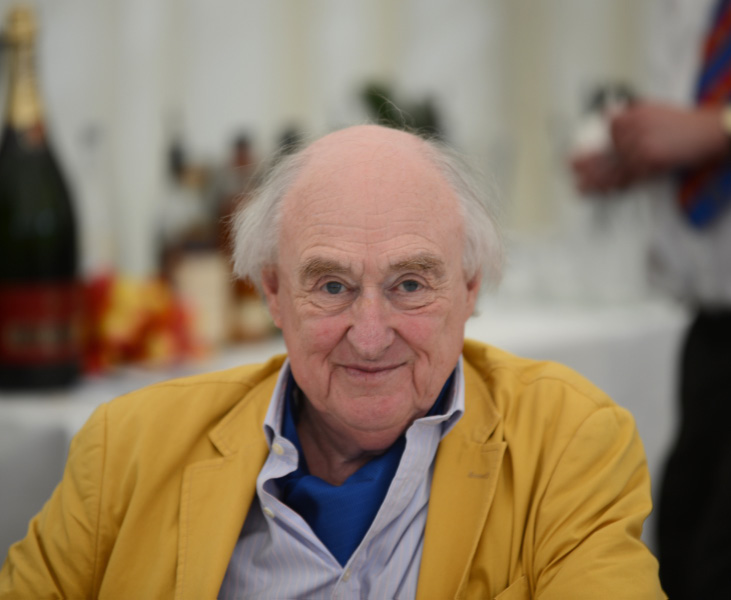 BBC News
BBC NewsBorrowing was £17.4bn last month, the second highest October figure since monthly records began in 1993.

Henry Blofeld
When I think back at my education, it’s important that my father was a great reader aloud which is something which happens less today. He not only had a beautiful voice, but was extremely articulate and was really an academic I suppose. Wodehouse was one of those authors he introduced me to between the ages of 10 and 16. Of course, those books have dated a bit but they’re very funny indeed.
What was the particular impact of Wodehouse on me? There’s a book by Wodehouse Psmith in the City – you need to read the first word without the ‘P’ because as Wodehouse says, ‘the P is silent’ – which describes an extraordinarily similar path to my early career. Wodehouse was in the City, and so was I; both of us were rather out of place and rather eager to leave. Perhaps that’s part of my kinship with him.
Nowadays a lot of my memories of cricket might be described as somewhat ancient. I see myself as a historian, reminding fans of today about the past. as the Ashes roll round again, I think of the great jousts of the past.
One mentor for me was the great writer John Arlott, who adored Hobbs – and Jack Hobbs could be said to be the greatest batsman ever produced. He played his first test match in Melbourne in 1907. And played his last test in 1930 – he and Sutcliffe together were the most extraordinary pair, and particularly noted for the runs they made in old-fashioned sticky wickets in Australia. He must have been the most supreme technician and was every bit as good in defence as Geoffrey Boycott but in attack lived in another world.
I hope that this Ashes series will be played in the right spirit. WG Grace was another amazing cricketer – he was one of the greats, but not a great man. In fact, he comes quite badly out of the chapter in my book. For example, in the match in 1882, when Grace ran out Jones – that was entirely reprehensible and an appalling thing to do. It’s worth remembering that it was more appalling in 1882, than it was in 1982.
In that year, as many cricket fans know, Botham ran Boycott out at Christchurch – but that was done deliberately as he was sent in to run him out. It took him two balls, and was one of the funniest things I’ve ever seen. Boycott pushed the deliver to the offside, and there there ensued a lot of sashaying up the pitch – and then the whole rigmarole of: “Yes, no – wait!” Once he was out, Boycott said: “Do you know what I’ve done? And Botham said: “I’ve run you out, you –—“. I can’t remember precisely what word he used, but it was something very flowery. On that occasion, Boycott withdrew in a sulk.
Of course, they say the game has changed and become punchier. That might be true but it can also be done. Sometimes I hear people reminiscing about sedate appeals in the interwar years. But if you look at photographs of cricket in the old days, they all go up like mad. Perhaps distance has leant a certain enchantment. Do you think there was an age in life when bowlers were uncorrupted? All that we know about human nature makes that seem unlikely.
I am often asked about my famous surname. I knew Ian Fleming a bit, but I didn’t exactly think much of him – and I don’t go to the Bond films to see my family name written in lights. Fleming and I were elected to Boodle’s on the same day. I got to know Ian quite well, which is why I had dinner with him and my first wife in Jamaica, when I was 22. I was quite young to be meeting such well-known people. I suppose that did make me more confident later on.
Journalism has changed too. In the early days of broadcasting, I would do reports of county matches, stopwatch in hand. It was a very, very hairy business and to do that one had to have a certain confidence. For instance, I can remember sitting on a sack of sawdust in the groundsman’s office at Sydney at the back of the Noble stand without any windows at all, doing a report for Sport on Four. I remember other extraordinary situations. I can remember doing reporting on a total eclipse of the sun from Bombay, and describing the riots in Lahore during the 1977 Test Match.
I shall enjoy the Ashes but am never so excited by the one-dayers. I can see the point of One Day Cricket in the same way I can see the point of instant coffee – which I find quite undrinkable. One Day Cricket was introduced as a financial palliative, and it’s not ideal in my view. Perhaps one day we’ll have the ultimate cricket match where each side will have one ball, bowled in front of 100,000 people.
Henry Blofeld’s new book is Ten to Win…and the Last Man In is out now